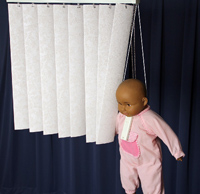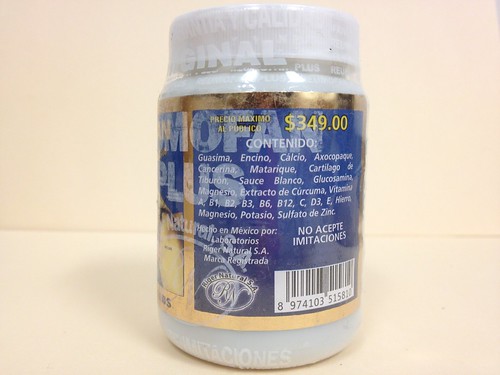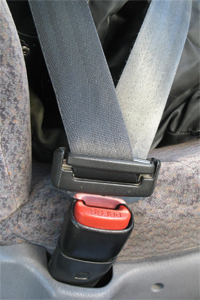Posts Tagged ‘“product liability”’
Defective Blind Xpress Window Blinds Recalled
 The case of a young Michigan girl strangled to death in a vertical blind has prompted the recall of about 139,000 custom-made vertical window blinds and 315,000 horizontal products.
The case of a young Michigan girl strangled to death in a vertical blind has prompted the recall of about 139,000 custom-made vertical window blinds and 315,000 horizontal products.
The Consumer Product Safety Commission (CPSC), in cooperation with Blind Xpress of Livonia, Michigan, announced the recall on September 6. The two-year-old girl from Commerce Township was reportedly strangled in the hanging loop of a Blind Xpress vertical blind cord in 2009.
The CPSC is recalling the defective window blinds because the design makes it easy for children to become entangled in the cord loop. Part of the problem is the custom vertical blind cords do not have a cord-tensioning device that attaches to the wall or floor. The horizontal blinds do not have inner cord stop devices.
The recall involves Blind Xpress blinds sold in specialty stores in Michigan, Ohio and Indiana from January 1995 through December 2011. The defective blinds were manufactured in the United States.
The CPSC urges consumers to immediately stop using the window blinds and contact the Window Covering Safety Council for a free repair kit. The toll-free number is 800-506-4636.
According to CPSC data, were 147 incidents involving children being injured or killed from 2004 to 2010 – or 21 per year.
The CPSC, industry and safety groups have made several efforts over the past couple decades, including recall/retrofit programs. The major push came in 2009, when after the death of 16 children, the industry recalled 55 million Roman Shades with exposed inner cords on the back of the shades.
The Parents for Windows Blind Safety, a non-profit organization which advocates for more stringent regulations, says the hazard lies with cords which stretch more than 7 1/4 inches. It proposes the window blind industry sell cordless blinds or those with inaccessible cords.
Related:
- Death of Child Prompts Recall of Window Blinds by Blind Xpress, Consumer Product Safety Commission.
- The History of Corded Window Covering Recalls, Parents for Window Blind Safety.
DePuy Hip Implant Cases Settled for $600,000
Johnson & Johnson has agreed to pay about $600,000 to resolve three product liability cases involving its DePuy hip implants, which were recalled in 2010 after hundreds of patient complaints and a study emerged revealing a substantial device failure rate.
The New Jersey-based company settled the cases of three women who had filed claims in a Las Vegas court. All three women had required a second hip revision surgery to treat and correct their pain. Each will receive about $200,000. The cases had been scheduled for trial Dec. 3.
The next three lawsuits involving defective DePuy hip implants are set for January in a Maryland state court.
In August 2010, Johnson & Johnson’s DePuy unit recalled 93,000 of its ASR hip implants globally and 37,000 in the United States. The recall was announced alongside results of a study from a UK joint replacement registry, which showed 12 percent of patients required a second revision surgery within five years. The Food and Drug Administration (FDA) also reported it had received about 400 complaints from patients in the two years prior.
Since the DePuy hip recall, more than 8,000 patients across the country have filed lawsuits against the medical device maker, alleging the ASR hips are defective. About 6,000 of these have filed in federal court.
Patients claim the DePuy metal-on-metal hip implants are defective, saying they caused friction between the metallic ball and socket components. The recalled DePuy hip implant can wear down and produce metallic particles in patients’ bloodstreams, along with pain, joint dislocations, infections and bone fractures.
Johnson & Johnson said it has spent about $800 million on the hip implant recall.
Related:
- J&J said to pay $600,000 to settle first suits over hips, Bloomberg Business Week.
- DePuy hip implant recall leads insurers to seek recovery, Massachusetts Injury Lawyer Blog.
Defective Drug Warning: Reumofan Diet Supplements
 Those who take so-called “natural dietary supplements” want to listen to the Food and Drug Administration’s (FDA) latest alert on Reumofan Plus and Reumofan Plus Premium, which have now been linked to cases of death and stroke.
Those who take so-called “natural dietary supplements” want to listen to the Food and Drug Administration’s (FDA) latest alert on Reumofan Plus and Reumofan Plus Premium, which have now been linked to cases of death and stroke.
“Consumers who are currently taking Reumofan Plus or Reumofan Plus Premium, or who have recently stopped taking it, should immediately consult a health care professional,” said Elizabeth Miller, Pharm.D., acting director of FDA’s Division of Non-Prescription Drugs and Health Fraud.
The FDA issued its first alert on the dangers of Reumofan Plus on June 1, stating the drug had several active pharmaceutical ingredients not listed on the label. This week, the agency issued an updated alert for both the drug and Reumofan Plus Premium, saying it had since received reports of death, stroke and these symptoms:
- Severe bleeding in the gastrointestinal tract
- Dizziness
- Insomnia
- High blood sugar levels
- Problems with liver and kidney functions
- Corticosteroid withdrawal syndrome
These defective products are marketed as natural dietary supplements which treat arthritis, muscle pain, osteoporosis and bone cancer. If not properly supervised by a medical professional, those who stop taking the supplements can face serious withdrawal symptoms.
The defective drugs may contain corticosteroids and abrupt discontinuation can supress the adrenal glands, which regulate a number of hormone and body functions. Users could experience fatigue, low blood sugar levels, fainting and other symptoms.
The Reumofan products are manufactured in Mexico by Riger Naturals and sold on the Internet, flea markets and some retail outlets. The Mexican Ministry of Health has also issued a health warning to its citizens and ordered Riger Naturals to recall the products.
FDA testing of Reumofan Plus and Reumofan Plus Premium show they contain two ingredients which require prescriptions: diclofenac sodium and methocarbamol. Reumofan Plus also contained dexamethason, a type of corticosteroid.
The FDA offers consumers these tips for avoiding defective and dangerous drugs:
- Be wary of off-the-counter products which only have prescription counterparts.
- Be cautious when a label has a foreign language.
- Be aware that so-called “natural dietary supplements” are not subject to the same FDA pre-market review as prescription drugs and some over-the-counter drugs.
Related:
- Reumofan Products Pose Risk to Consumers, Food and Drug Administration.
- Dietary Supplements, Food and Drug Administration.
Product Liability: Magnet Desk Toy is Children’s Choking Hazard
 The Consumer Product Safety Commission (CPSC) has taken a rare legal action seeking to stop sales of a magnet desk toy, alleging children are swallowing the pieces, then suffering serious injuries requiring surgery.
The Consumer Product Safety Commission (CPSC) has taken a rare legal action seeking to stop sales of a magnet desk toy, alleging children are swallowing the pieces, then suffering serious injuries requiring surgery.
The CPSC filed an administrative complaint on July 25 against Maxfield & Oberton Holdings LLC, of New York, N.Y., the maker of Buckyballs and Buckycubes. The government agency and company failed to agree on the CPSC’s proposed voluntary recall plan for the magnet sets with 216 units.
The CPSC alleges the popular desk furnishing contains a defect in design, packaging, warnings and instructions. It wants the company to stop selling the defective product, notify the public about potential for injury and offer consumers a full refund. It is the CPSC’s second time taking this type of legal action in 11 years.
The CPSC is intervening after receiving more than two dozen of reports young children and teenagers have swallowed the magnets, requiring surgery. At least a dozen involved Buckyballs.
When two or more magnets are swallowed, they can move toward each other through the stomach and intestinal walls, resulting in serious injuries such as holes in the stomach, intestinal blockage, blood poisoning and possible wrongful death.
The CPSC reports young children are removing the magnets from the kits and placing them in their mouth. Meanwhile, older children and teenagers have unintentionally swallowed the magnets while placing them in their mouths to mimic having a tongue ring.
At least 10 retailers, including Amazon.com, have agreed to stop selling the defective product. EBay is also removing these listings from its online marketplace.
In May 2010, the CPSC and Max & Oberton conducted a cooperative recall of about 175,000 Buckyball magnet sets for mislabeling. The toys were labeled “Ages 13+” and did not meet the federal toy standard that loose magnets not be sold for children younger than 14. Injury reports preceded and followed the notice.
In November 2011, the CPSC and Max & Oberton worked cooperatively to warn about the dangers that could occur, but injuries continued, leading to the CPSC’s latest action. The CPSC now says a recall is necessary because all these prior steps have been ineffective.
Related:
- CPSC Sues Maxfield & Oberton Over Hazardous Buckyballs and Buckycube Desk Toys, Consumer Product Safety Commission.
- Feds file suit against Buckyballs, retailers ban product, USA Today.
Actos Warning From FDA
Hundreds of thousands of diabetes patients have been re-considering their medication plans after a recent warning from the Food and Drug Administration (FDA).
On June 15, 2011, the FDA issued a safety communication reporting that use of the oral diabetes medication Actos (pioglitazone) for more than one year may be associated with an increased risk of bladder cancer.
The FDA warned that patients with active bladder cancer should not be taking pioglitazone and those with a prior history should only use it after considering the potential medical benefits against the risk for cancer recurrence.
Actos is an oral drug used to treat type II diabetes, the most common form of the illness that plagues 25.8 million Americans. Actos is manufactured by Takeda Pharmaceutical Company and co-marketed by Eli Lilly and Company. It is one of the most widely used medications on the market. Over 2 million patients filled prescriptions for it in 2010.
The communication came as the FDA placed restrictions on Avandia, another popular medication, after studies showed it increased the risk of heart attacks. Both drugs belong to the thiazolidinedione class of drugs.
The warning about Actos came as the FDA made a periodic review of an ongoing 10-year Actos study into the risk for developing bladder cancer. The study reports there may be a 40 percent greater risk for developing bladder cancer among those who take Actos for more than a year.
The FDA’s warning came a new epidemiological study out of France suggested an increased risk of bladder cancer with pioglitazone use. As a result, France has suspended use of Actos and Germany has recommended new patients not be placed on the drug.
On August 4, 2011, the FDA reported it had approved new label and medication instructions for Actos. The FDA is continuing to monitor the results of Actos cancer studies.
Patients taking Actos should contact their doctors if they experience any sign of blood in the urine or a red color in the urine or other urinary pain, as these Actos complications may be signs of bladder cancer.
Click here to read the June 15, 2011 FDA Safety Communication on Actos.
Read More
Youth Bicycle Helmets Recalled
 Parents are advised to check their children’s bicycle helmets after a widespread recall involving popular models sold at Walmart and Amazon.com. The recall may affect families and cyclists in Massachusetts.
Parents are advised to check their children’s bicycle helmets after a widespread recall involving popular models sold at Walmart and Amazon.com. The recall may affect families and cyclists in Massachusetts.
Bell Sports of Scotts Valley, California is recalling 33,600 of its Bell Exodus full-face helmets with a plastic buckle on the chinstrap. The defective bike helmets have an angled visor and came in multiple colors in youth size. They were sold at Walmart stores and Amazon.com for $50 to $60 between August 2009 and March 2011.
The helmets pose a head injury hazard in the event of bike accident. The plastic buckle that connects the chin straps can fail and cause the helmet to fall off the person’s head, leaving them unprotected in bicycle accidents. The company has received one report of a buckle failing, resulting in a personal injury that required facial stitches.
Some 31,100 of the defective bike helmets were sold across Massachusetts and the United States. Another 2,500 helmets were sold in Canada.
Consumers are advised to stop using the helmets immediately. Read about the bike helmet recall on the Consumer Reports website. You will find a list of model numbers.
Contact Bell Sports if you have a defective helmet and request a free replacement. Call Bell Sports toll-free at 866-892-6059 between 8 a.m. and 5 p.m. CT Monday through Friday.
If you are a cyclist, wearing a helmet is critical to reducing the risk of head injuries. It is also critical for your children. It is important to purchase a helmet which is safe for use, meets CPSC standards and to learn how to properly fit your helmet. To learn more, read this brochure from the NHTSA – and share it with your friends and family members who ride.
Another important safety tip is to replace your helmet regularly. We hope you never fall or are injured in a bicycle crash, but if you do fall, your helmet should be able to absorb the fall and provide protection. Once a helmet hits the ground in a crash, it should be replaced right away. If you don’t crash, you maybe able to use your helmet for a few years. You have to carefully inspect your helmet, evaluate the condition of the helmet and the wear and tear on helmet straps. Some people should replace helmets every year and others may work for two or three years.
In Massachusetts, cyclists who are 16 and younger are required by law to wear bicycle helmets. Bike share programs in the Boston area typically have language in their rider contracts, requiring cyclists to wear helmets at all times. Wearing a bicycle helmet is a step every cyclist can take to protect themselves, so we hope you and your family take time to purchase helmets and commit to wearing them. Read More
Salmonella in Alfalfa Sprouts Prompts Recall in Massachusetts
UPDATE
Jonathan’s Sprouts of Rochester, MA, has widened the recall of its sprout products due to Salmonella contamination. The recall now includes all sell-by dates, including its conventional, organic, and bulk products. The recall includes other sprouts, such as radish, dill, and gourmet mix. Check below for stores where these products were sold. Do not eat them! Return them to the store for a refund.
More information: FDA Recall Press Release.
ORIGINAL POST
The USDA has found Salmonella, a dangerous bacteria related to food poisoning, in Jonathan’s Alfalfa Sprouts products.
 Salmonella, if ingested, can cause serious and sometimes fatal illness and infections in young children, frail or elderly people, and others with weakened immune systems. The symptoms of Salmonella include fever, diarrhea (possibly bloody), nausea, vomiting, and abdominal pain.
Salmonella, if ingested, can cause serious and sometimes fatal illness and infections in young children, frail or elderly people, and others with weakened immune systems. The symptoms of Salmonella include fever, diarrhea (possibly bloody), nausea, vomiting, and abdominal pain.
Jonathans Sprouts has issued an immediate recall of the following effected products:
- Jonathan’s 4oz Alfalfa Sprouts
- Jonathan’s 4oz Alfalfa with Radish Sprouts
- Jonathan’s 4oz Gourmet Sprouts
- Jonathan’s 4oz Alfalfa with Dill Sprouts
- Jonathan’s 8oz Alfalfa Sprouts
Window Blind Design Reconsidered After Numerous Infant Deaths
The Consumer Product Safety Commission (CPSC) has asked manufacturers to re-design window blinds so as to eliminate the risk of infant wrongful death from strangulation.
Window blind manufacturers have known about the problem for decades, starting with a federal study in the 1980s that tied 41 child strangulation deaths to drapery and blind cords. Since then, manufacturers have dragged their feet when it comes to improving safety.
And infants are still dying. The NY Times reports that in August 2009, Kathleen Leeson put her 2-year-old son down for a nap. A short time later, Ms. Leeson discovered her son hanging, lifeless, an inch off the floor with the window blind cord wrapped around his neck. Further, in 2002 1-year-old Cheyenne Kaiser was found by her mother strangled sitting up in her crib, which was next to the window, with the inner window blind cord wrapped around her neck.
The CPSC has released a safety alert for concerned parents explaining the risk of personal injury and wrongful death to children from the various types of window blind cords. In its safety alert, the CPSC makes four recommendations to help prevent these tragic strangulation injuries:
- Use only cordless window blinds in all homes where children live or visit;
- Do not place cribs, beds, or furniture close to windows where children can climb and gain access to the cords;
- Make all loose cords inaccessible; and
- In windows with looped bead chains or nylon cords, use tension devices to keep the cord taut.
Moreover, in response to the industry’s unenthusiastic attempts at improving product safety, a task force of regulators, consumer advocates, and industry leaders have come together to find a solution by the fall of 2011.
The CPSC has also warned the window blind industry that, if it cannot reach a solution soon to minimize these life-threatening dangers, it may face mandatory safety regulations.
Supreme Court Ruling in Defective Seat Belt Case Victory for Consumers
 In a unanimous 8-0 ruling, the U.S. Supreme Court recently held that the Federal Motor Vehicle Safety Act does not preempt product liabililty claims brought under state common law for defective seat belts.
In a unanimous 8-0 ruling, the U.S. Supreme Court recently held that the Federal Motor Vehicle Safety Act does not preempt product liabililty claims brought under state common law for defective seat belts.
In 1993, the Federal Motor Vehicle Safety Standard (FMVSS) 208 required lap/shoulder belts in all vehicle seats except certain rear seats in vans. In the regulation, the National Highway Traffic Safety Administration (NHTSA) specified lap/shoulder belts were safer, but requiring them in all seat positions would not be cost-effective. The authorizing statute provided that compliance with the standard did not exempt manufacturers from common law liability.
Thanh Williamson died in a car accident while traveling in a Mazda mini-van that fell under this regulation. She was wearing a lap-only seat belt. Her family sued Mazda, alleging the company had a duty under state law to install the safer lap/shoulder safety belts. The case is Williamson v. Mazda Motor of Am., Inc.
A California trial court dismissed the lawsuit, finding the Federal regulation preempted the claims. An appellate court affirmed, relying on the ruling in Geier v. American Honda Motor Co. In that case, the court determined that the preemption applied in an auto defect claim involving the manufacturer’s failure to install air bags.
In Williamson, the Supreme Court distinguished between the regulations governing air bags and seat belts and said the seat belt regulation explicitly encouraged car manufacturers to install lap/shoulder belts. NHTSA supported the plaintiffs in an amicus brief, arguing that its policy objectives would have been met if the lap/shoulder belts had been installed.
Without a regulatory objective blocking installation of the lap/shoulder seat belts, the Court held that the auto manufacturer could not claim preemption based on the Federal agency’s judgment of cost-effectiveness. Such a judgment does not signify preemptive intent in most Federal safety standards, the Court said.
The Court’s ruling was a victory for consumers in the United States. Having the right to bring claims against manufacturers for defective products is not only a vital way to compensate people injured or killed by the defective products; product liability cases are also a strong force for the improvement of safety in consumer products.
Read More
Topomax Linked To Birth Defects
Pregnant women taking Topomax have an increased risk of bearing children with birth defects such as a cleft lip or palate, the Food and Drug Administration (FDA) announced today. The agency is now changing the drug’s label warning and pregnancy classification to inform women about the drug’s defects.
Topomax – known as topiramate in its generic form – is prescribed to treat epileptic seizures and prevent migraine headaches. It is also used on an off-label basis to treat weight loss, alcohol dependence and psychiatric illnesses such as bipolar disorder.
Topomax is manufactured by Ortho-McNeil-Janssen, which has headquarters in Raritan, New Jersey.
New data from the North American Antiepileptic Drug Pregnancy Registry show infants exposed to topiramate as a single therapy in the first trimester had a 1.4 percent prevalence of personal injury and oral cleft birth defects.
This is compared to .38 – .55 percent for other antiepileptic drugs. The oral cleft birth defect rate was .07 percent for infants born to mothers without epilespy and who were not treated with other antiepileptic drugs.
The FDA has re-classified Topomax from a Pregnancy Category C to Pregnancy Category D drug, indicating there is positive evidence of human fetal risk based on human data but the potential benefits from use of the drug in pregnant women may be acceptable in certain situations despite its risks.
The FDA is advising doctors to avoid prescribing the defective drug to women of childbearing age because oral clefts occur in the first trimester before many women know they are pregnant. Doctors are advised to seek alternative medications or if that’s not possible, to recommend proper use of birth control.
Read More


